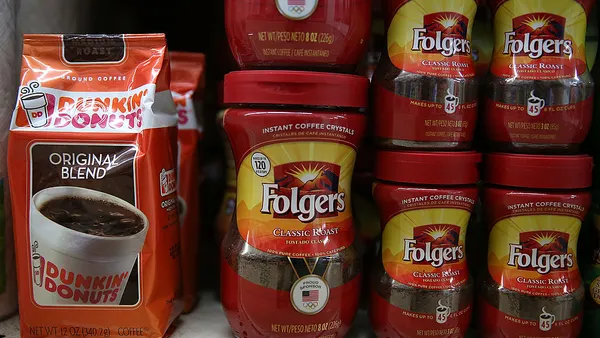Dive Brief:
- As the coronavirus outbreak continues to disrupt global supply chains, "companies will be compelled to go much further in rethinking their sourcing strategies — indeed, their entire supply chains," Kearney predicts in its latest Reshoring Index.
- The U.S.-China trade war caused supply chains to diversify away from China, pushing the manufacturing import ratio (MIR) in the report to "unprecedented" levels in 2019 — 98%, up from -32% in 2018. A positive figure indicates net reshoring and a negative figure indicates an increase in offshoring.
- The MIR's increase does not indicate companies are coming back to the U.S., however. Instead, the report found U.S. manufacturing output was "virtually unchanged" from 2018, while firms reduced imports from China and increased imports from other Asian countries and Mexico.

Dive Insight:
First the trade war, and now the coronavirus outbreak have begun to shift supply chain managers' thinking when it comes to sourcing from China, and low-cost sourcing in general.
"The trend where companies are moving more and more away from China as their sole source of cost-effective manufacturing is here to stay, even if the Trade War were to end," Patrick Van den Bossche, a partner and member of the board of directors at Kearney, told Supply Chain Dive via email. Companies have now realized that optimization for cost is not the right answer if the risk of disruption is spiking every few years. But ... they’re not necessarily coming back to the U.S. in droves."
The MIR indicated "the largest relative import decline since we started tracking the Reshoring Index" in 2011, according to Kearney. Driven by an "America first economic policy," the report found the total value of U.S. imports from the 14 low-cost-countries in Asia it tracks (including China, India and Vietnam) was $757 billion in 2019, down from $816 billion in 2018.
But as COVID-19 spreads and affects global operations, supply chain diversification plans "are still going to not be as efficient," LevaData CEO Rajesh Kalidindi recently told Supply Chain Dive, as the virus can disrupt multiple supply bases simultaneously. But companies that have those plans in place will "at least have multiple alternate sites that have already been qualified," allowing them to come out of the crisis much stronger than firms with less-regionalized supply chains.
The few companies that have reshored to the U.S. are typically smaller operations making specialized products for a niche market where they can demand premium prices, Van den Bossche said.
"Bigger companies that have reshored have often struggled to find the amount of qualified, skilled labor that they need to operate, and they often had to resort to training their own operators — not just in product- or industry-specific skills but sometimes even in ‘the basics’," Van den Bossche said.
To get around this, some firms have invested in automation techniques such as robots, cobots, or artificial intelligence tools that can make human workers faster and more efficient. However, Van den Bossche said Kearney has not seen companies ramp up those kinds of investments just yet.














